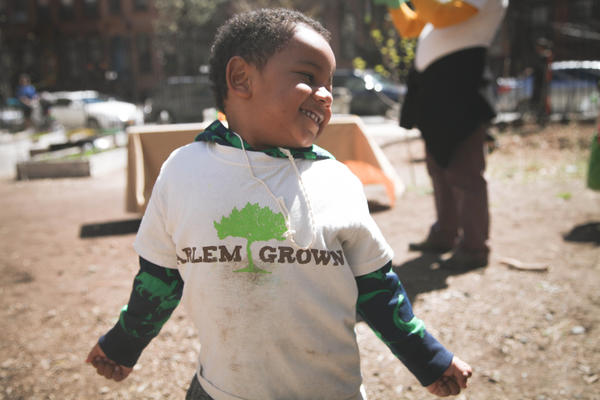This year, the Climate Week NYC events program is organized into ten themes: built environment, energy, industry, policy, environmental justice, transport, finance, sustainable living, nature, and food. ‘Food’ is one of Climate Week NYC’s themes because food ties us directly to the Earth; we as people are dependent on the Earth to provide for our survival. When we honor this relationship, food can provide security and nourishment without devastation to the environment. Food is also one of the leading sources of greenhouse gas emissions globally. Our intimate relationship with food and the planet has been replaced by a globalized, industrialized, and specialized food system whose weaknesses were revealed during the COVID-19 pandemic.
COVID-19 revealed how vulnerable our current food system truly is.
For some, the weaknesses in our food system, and disruption in the food supply at the onset of the pandemic manifested in empty grocery store shelves. For many, the loss of income and livelihoods due to the pandemic led to a spike in food insecurity. Homes around the US reporting that they “do not have enough to eat” tripled during the pandemic. (Black and Latinx households were twice as likely to report food insecurity as compared to white households.) These systemic vulnerabilities will not disappear as we recover from the pandemic—they will only be exacerbated by climate change.
Agriculture is one of the primary sectors that will be most severely impacted by the climate crisis: suffering from extreme weather, disease, pests, and soil erosion. It is also one of the largest sources of climate change.
When we go beyond accounting for just the greenhouse gases produced by agriculture to account for the entire food system, we can see that approximately half of all global GHG emissions revolve around food. This shocking number accounts for food waste, the transport of agricultural commodities and final products, food processing and packaging, farming (especially livestock), deforestation to feed livestock and produce palm oil and sugar for processed foods, and refrigeration of food. Our current food system is also reliant on fertilizers, pesticides, and irrigation practices that threaten the health of waterways, soil, and people.
Our current global food system is not only devastating to the environment but is also extremely unjust.
Our food system has left many people in the world hungry. This is not because we are failing to grow enough food; it is an issue of extreme inequality and our industrial food system that instigates the production, trade, and promotion of resource-intense foods. Today, only 55 percent of what we grow goes directly to feeding people. The rest goes towards feeding livestock and creating biofuels and industrial products. During the pandemic, as restaurants and businesses shut down, already struggling farmers, saw a huge decrease in demand for their products. We need to cultivate more direct, resilient food systems that feed consumers and producers.
Although hunger has skyrocketed because of the pandemic, food insecurity is not a new issue. Even before March 2020, more than 37 million people in the United States were food insecure. Due to a history of disenfranchisement, these rates are much higher for Black, Indigenous, and People of Color (BIPOC) who live in areas of food apartheid – a term used to describe the reasons why there is not equitable access to healthy food in certain areas.
These areas and cannot be “fixed” with the simple addition of a new grocery store. Food justice activist, Karen Washington advocates for the use of the term food apartheid as she believes it offers a more holistic view of food systems including how pre-existing social and racial inequities play a role. Understanding food apartheid invites us to look beyond band-aid solutions and address the root causes by creating lasting solutions that put autonomy back in the hands of community members.
As we look for solutions that create more resilient communities and nourish the planet and its people, we should look towards a system rooted in food sovereignty.
La Via Campesina coined the term food sovereignty as the right of people to healthy and culturally appropriate food that is sustainably produced as well as their right to define their own food and agriculture systems. Food sovereignty encompasses six main principles: It focuses on food as more than just a commodity and strives to localize and center food systems around those who grow, harvest, and process food. By using diverse agroecological methods, rooted in indigenous practices, food sovereignty works with ecosystems while improving their resilience and adaptability. This is crucial in the face of climate change.
Local efforts led by BIPOC and frontline communities in New York City and all over the world—offer ways to surpass food security and ground our food systems in food sovereignty.
Initiatives like Kelly Street Garden and Harlem Grown not only work to nourish local residents with free produce grown in the urban gardens. They take ‘food is healing’ to another level by providing job opportunities, offering education through cooking classes, teaching youth how to grow their own food, and by carving out a green space for community to grow. These organizations offer an example of how we can address issues of inequity at the root and redistribute power to the people so that the right to sufficient, healthy and culturally appropriate food is ensured.
We can reclaim and wield the power of food to promote connection, health, sustainability, and justice for all people.
The pandemic has provided us with a special opportunity to reimagine our food systems and look to those who are already seeding sovereignty in their communities, to uncover and strengthen our connections to the land, food, and the people who provide it. We can seize this opportunity to combat climate change and feed the world’s people in a healthy and just way.
For more on climate change, food, social justice, and their intersection tune into all food-themed events happening throughout Climate Week NYC.
